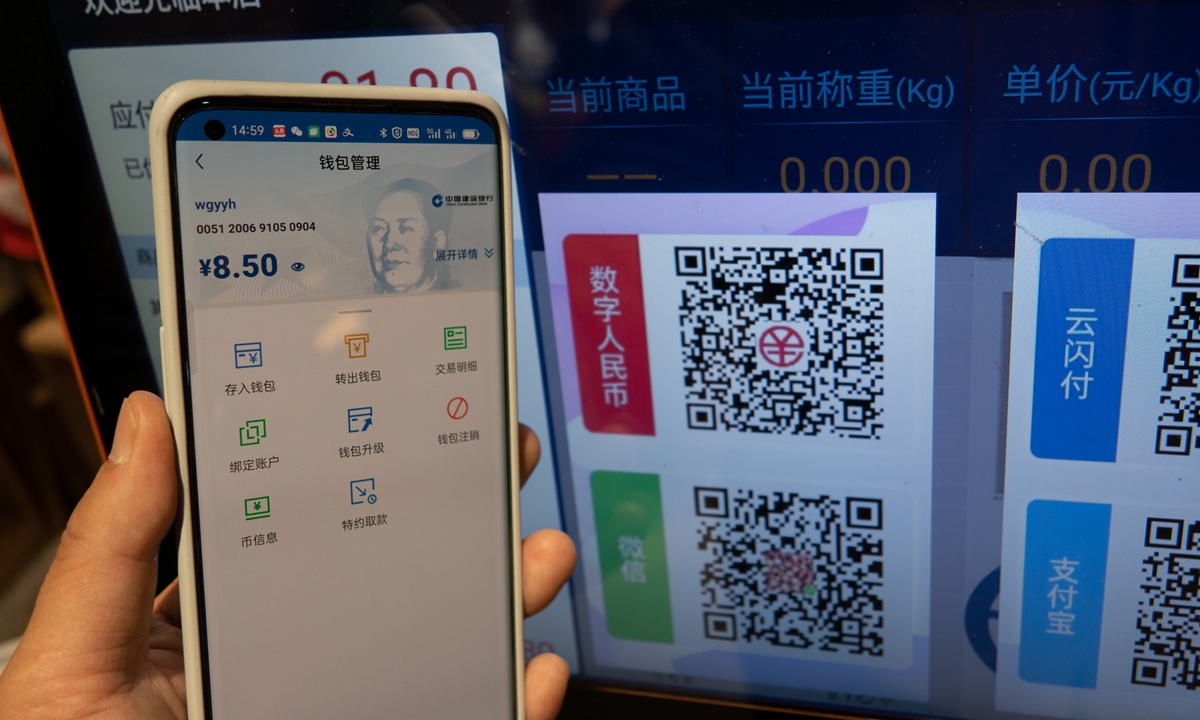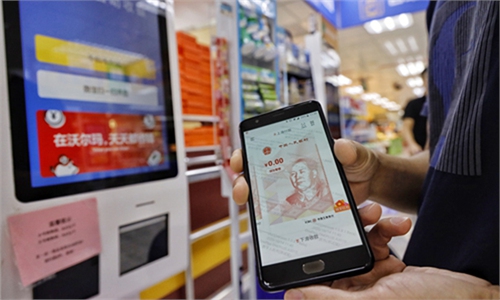
Shanghai residents used digital yuan to buy fruit at a market. China has held large-scale tests of its digital currency since October, with trials in cities including Beijing, Shanghai, Shenzhen, Suzhou and Chengdu in June, 2021. Photo: cnsphoto
China's digital currency, the e-CNY, has shown more charm thanks to 400,000 eye-catching application scenarios and multiple trail activities at the ongoing Beijing 2022 Winter Olympic Games, which analysts say paves the way for a further large-scale national rollout and cross-border application.The Olympic Games marks the first time that the central bank-backed sovereign digital currency is available for international users. The e-CNY is one of three forms of payment available to athletes and visitors at the Olympic Games, along with Visa and cash, and the only one that supports contact-less payment for the need of epidemic prevention and control.
"It's really convenient, with just a touch, I bought my Bing Dwen Dwen with the digital yuan wallet," a volunteer surnamed Zhang who's working in the Olympic Village told the Global Times on Wednesday.
Zhang, who has never used the service before, said there are several digital yuan service desks in the Olympic Village, and she learned how to download, activate and use the digital yuan with the guidance of the desk staff.
Zhang said consumers can show their digital yuan payment code, or use the digital yuan hard wallet, to "touch" the merchant's point-of-sale machine to complete the payment. "It's also safer since you do not need any person-to-person contact by using the digital yuan."
According to the People's Bank of China, the central bank, the digital yuan has been tested in more than 400,000 Olympics-related scenarios. Consumers can use the digital yuan widely - not only at venues in the competition zone but also outside the "closed-loop" for various services, including transportation, catering, accommodations, shopping and tourism.
During the Beijing Winter Games, Bank of China, the official partner of the Beijing Olympics, has received quite a few inquiries on opening digital yuan wallets, including from foreign nationals, a staffer at the bank told the Global Times on Wednesday, as the payment method is gaining more popularity.
In order to make it easier for foreigner guests to experience the digital yuan during the Winter Olympics, authorities have optimized the process, and visitors can open digital yuan wallets without a domestic bank account.
Foreign nationals only need to download the digital wallet app to their smartphones and pass the verification process with overseas mobile phone numbers to open a digital yuan wallet. The wallet has a balance cap of not more than 10,000 yuan ($1,572), the person from Bank of China said.
The Olympic Games would be a good opportunity for foreign visitors to familiarize themselves with the digital yuan and make it more convenient for domestic and foreign consumers to pay, Cao Yin, managing director of the Shanghai-based Digital Renaissance Foundation, told the Global Times on Wednesday.
"The test of the digital currency with foreign visitors can help solve the issue of money exchange when they come to China. The move is expected to facilitate foreigners' travel experience to China after the border reopening," Cao said. "It is expected that the quota for the exchange will be gradually relaxed in the future."
The development of the digital yuan will not be limited to domestic scenarios. For example, Chinese tourists traveling abroad can use the payment method for consumption abroad. Countries along the Belt and Road Initiative can also use the digital yuan in trade and investment, he added.
Since its debut in late 2019, the digital yuan has been accessible in 11 Chinese cities and scenarios, including Shenzhen, Shanghai, Chengdu and the Beijing Winter Olympic Games.
As of October 22, 2021, more than 140 million personal wallets had been opened, with a transaction volume totaling near 62 billion yuan, according to the People's Bank of China.
Meanwhile, 1.55 million merchants now support digital yuan wallet transactions in areas such as public utilities, catering services, transportation, shopping and administrative services.

